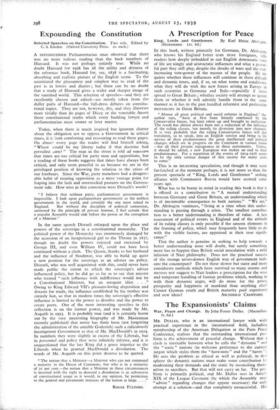Expounding the Constitution
A DISTINGUISHED Parliamentarian once observed that there was no more tedious reading than the back numbers of Hansard. It was not perhaps entirely true. While no doubt Hansard for 1938 has all the utility and dryness of the reference book, Hansard for, say, 1838 is a fascinating, absorbing and realistic picture of the English scene. To the uninitiated the pleasantest and simplest way to read of the past is in letters and diaries ; but there can be no doubt that a study of Hansard gives a wider and sharper image of the vanished world. This selection of speeches—and they are excellently chosen and edited—are mostly taken from the duller parts of Hansard—the full-dress debates on constitu- tional topics. They are not, however, dry, and they illustrate more vividly than do pages of Dicey or the venerable Anson those constitutional truths which every budding lawyer and parliamentarian must sooner or later master.
Today, when there is much inspired but ignorant chatter about the obligation not to oppose a Government in critical times, it is both comforting and reassuring to read these pages. On almost every page the reader will find himself asking, " Where would be my liberty today if that doctrine had prevailed awn? " The man in the street is told ad nauseam that times are too critical for party men and oppositions, but a reading of these books suggests that times have always been critical, and only seem peaceful to us because we are in the privileged position of knowing the solution to the crises of our forebears. Since the War, party men.have had a disagree- able habit of treating opposition as a mere vantage point for leaping into the lush and overstocked pastures on the Govern- ment side. How wise in this connexion were Disraeli's words!
" I believe that without party, parliamentary government is impossible. I look upon parliamentary government as the noblest government in the world, and certainly the one most suited to England. But without the discipline of political connexion, animated by the principle of private honour, I feel certain that a popular Assembly would sink before the power or the corruption of a Minister."
In the same speech Disraeli enlarged upon the place and powers of the sovereign in a constitutional monarchy. The political power of the Monarchy was enormously damaged by the accession of an inexperienced girl to the Throne in 1837, though no doubt the powers enjoyed and exercised by George III, and even William IV, could not have been continued without a clash. The Queen, thanks to her husband and the influence of Stockmar, was able to build up quite a new position for the sovereign as an adviser on policy. Disraeli, who was well acquainted with this, could never have made public the extent to which the sovereign's advice influenced policy, but he did go so far as to say that anyone who treated " such influence with indifference would not be a Constitutional Minister, but an arrogant idiot. . . ." Owing to King Edward VII's pleasure-loving disposition and distaste for study, the influence established by his mother was entirely lost, so that in modern times the sovereign's effective influence is limited to the power to dissolve and the power to create peers. One of the most interesting speeches in this collection is on the former power, and was made by Mr. Asquith in 1923. It is probably true (and it is certainly borne out by the very interesting biography of Mr. Masterman recently published) that never has there been (not forgetting the administration of the amiable Goderich) such a ridiculously incompetent Government as that of Mr. MacDonald's in 1924. In numbers they were slightly in excess of the Liberals, but in personnel and policy they were infinitely inferior, and it is unquestioned that the late King did a grave injustice to the Liberals when he granted MacDonald a dissolution. The words of Mr. Asquith on this point deserve to be quoted.
" The notion that a Minister—a Minister who can not command a majority in the House of Commons, but who is in a minority of 31 per cent —the notion that a Minister in those circumstances is invested with the right to demand a dissolution is as subversive of constitutional usage as it would, in my opinion, be pernicious to the general and paramount interests of the nation at large. . . ."
ROGER FULFORD.








































 Previous page
Previous page